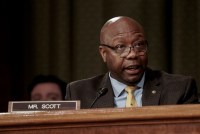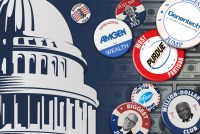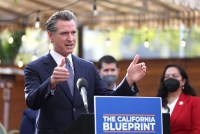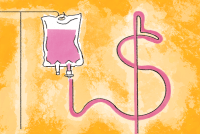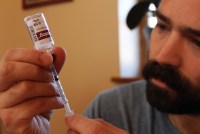Latest KFF Health News Stories
KHN’s ‘What the Health?’: Drug Price Bill Is a Go in the Senate
Two things happened in Washington this week that were inevitable: President Joe Biden tested positive for covid-19, and the Senate agreed to move forward on a budget bill that includes only a sliver of what Biden hoped it would. Still, the bill to allow Medicare to negotiate some drug prices, cap out-of-pocket drug costs for seniors, and extend temporary subsidies for Affordable Care Act insurance premiums would represent a major step if Democrats can get it across the finish line. Meanwhile, abortion battles continue to escalate around the country, with Texas leading the way in restrictions. Shefali Luthra of The 19th, Joanne Kenen of the Johns Hopkins Bloomberg School of Public Health and Politico, and Rachel Cohrs of Stat join KHN’s Julie Rovner to discuss these issues and more. Also this week, Rovner interviews Dr. Jack Resneck Jr., the new president of the American Medical Association.
Seeking to Kick-Start Biden’s Agenda, Schumer Unveils a Bill for Medicare Drug Price Negotiations
In addition to allowing federal officials to negotiate the price that Medicare pays for some drugs, the bill would cap annual out-of-pocket drug costs for Medicare beneficiaries at $2,000. But before Democrats can pass the bill under special rules that prevent Republicans from staging a filibuster, they must get approval from the Senate parliamentarian.
KHN’s ‘What the Health?’: The FDA Goes After Nicotine
The FDA is using its power to regulate tobacco products — ordering the vaping device Juul off the market and announcing its intention to lower the amount of nicotine in cigarettes and other products. Meanwhile, the Supreme Court rules on Medicare and kidney dialysis, and Congress makes progress on legislation surrounding guns and mental health. Joanne Kenen of the Johns Hopkins Bloomberg School of Public Health and Politico, and Rachel Cohrs of Stat join KHN’s Julie Rovner to discuss these issues and more. Also this week, Rovner interviews KHN’s Noam N. Levey about the new KHN-NPR project on the growing impact of medical debt.
A Proposal to Import Drugs from Other Countries Creates an Unusual Alliance in the Senate
As a Senate committee considered legislation to reauthorize the FDA’s user fee program, Sens. Bernie Sanders and Rand Paul agreed on a proposed amendment related to importing drugs from Canada, the U.K., and other nations.
KHN’s ‘What the Health?’: Taking a Shot at Gun Control
The U.S. House passed a package of bills seeking to keep some guns out of the hands of children and teenagers, but its fate in the Senate remains a big question mark. Meanwhile, the Federal Trade Commission takes on drug and hospital prices. Alice Miranda Ollstein of Politico, Anna Edney of Bloomberg News, and Joanne Kenen of the Johns Hopkins Bloomberg School of Public Health and Politico join KHN’s Julie Rovner to discuss these issues and more. Also this week, Rovner interviews Cori Uccello of the American Academy of Actuaries about the most recent report from Medicare’s trustees board.
Lawmaker Takes on Insurance Companies and Gets Personal About His Health
State Sen. Scott Wiener opens up about a weeklong stint in the hospital last year and what it’s like to live with Crohn’s disease. The San Francisco Democrat is pushing a bill that would require insurance companies to cover certain medications while patients appeal denials.
California quiere producir su propia insulina para bajar su alto costo, ¿lo conseguirá?
La administración del gobernador Gavin Newsom señaló que aproximadamente 4 millones de californianos han sido diagnosticados con diabetes, una enfermedad que puede destruir órganos, la vista y llevar a amputaciones si no se controla. La meta es prevenirlo con insulina más económica.
California Wants to Slash Insulin Prices by Becoming a Drugmaker. Can It Succeed?
Gov. Gavin Newsom proposed spending $100 million to make insulin affordable to millions of people with diabetes under a new state generic drug label, CalRx. But state officials haven’t said how much the insulin will cost patients or how the state will deal with distribution and other challenges.
KHN’s ‘What the Health?’: Washington’s Slow Churn
Stemming gun violence is back on the legislative agenda following three mass shootings in less than a month, but it’s hard to predict success when so many previous efforts have failed. Meanwhile, lawmakers must soon decide if they will extend current premium subsidies for those buying health insurance under the Affordable Care Act, and the Biden administration acts, belatedly, on Medicare premiums. Margot Sanger-Katz of the New York Times, Sandhya Raman of CQ Roll Call, and Rachel Cohrs of Stat News join KHN’s Julie Rovner to discuss these issues and more. Also this week, Rovner interviews KHN’s Michelle Andrews, who reported and wrote the latest KHN-NPR “Bill of the Month” episode about a too-common problem: denial of no-cost preventive care for a colonoscopy under the Affordable Care Act.
Medicare Surprise: Drug Plan Prices Touted During Open Enrollment Can Rise Within a Month
Even the savviest Medicare drug plan shoppers can get a shock when they fill prescriptions: That great deal on medications is no bargain after prices go up.
Journalists Cover the Gamut, From Rising Insulin Costs to Delays in Autism Care for Children
KHN and California Healthline staff made the rounds on national and local media this week to discuss their stories. Here’s a collection of their appearances.
US Rep. Gaetz’s Diagnosis of What’s Driving Insulin Costs Misses the Root Cause
A diabetes diagnosis is not always related to a person’s weight or overall health, especially for those with Type 1 diabetes, who are dependent on insulin treatment for life.
Why Cheap, Older Drugs That Might Treat Covid Never Get Out of the Lab
The hydroxychloroquine and ivermectin fiascoes have soured many doctors on repurposing drugs for covid. A few inexpensive old drugs may be as good as some of the new antivirals, but they face complex obstacles to get to patients.
KHN’s ‘What the Health?’: News You Might Have Missed
Congress is in recess, so the slower-than-average news week gives us a chance to catch up on underreported topics, like Medicare’s coverage decision for the controversial Alzheimer’s disease drug Aduhelm and ominous new statistics on drug overdose deaths and sexually transmitted diseases. Margot Sanger-Katz of The New York Times, Joanne Kenen of Politico and the Johns Hopkins Bloomberg School of Public Health, and Alice Miranda Ollstein of Politico join KHN’s Julie Rovner to discuss these issues and more. Plus, for extra credit, the panelists recommend their favorite health policy stories of the week they think you should read, too.
KHN’s ‘What the Health?’: Finally, a Fix for the ‘Family Glitch’
President Joe Biden welcomed former President Barack Obama back to the White House this week to announce a new policy for the Affordable Care Act that would make subsidies available to more families with unaffordable employer coverage. Meanwhile, Congress struggled to find a compromise for continued federal funding of covid-19 vaccines, testing, and treatments. Tami Luhby of CNN, Shefali Luthra of The 19th, and Jessie Hellmann of CQ Roll Call join KHN’s Julie Rovner to discuss these issues and more.
Big Pharma Is Betting on Bigger Political Ambitions From Sen. Tim Scott
The South Carolina senator led the congressional pack in pharma campaign contributions for the second half of 2021. There are clear reasons.
A KFF Health News database tracks campaign donations from drugmakers over the past 10 years.
California Governor’s Big Promises on Drug Prices Are Slow to Materialize
Gov. Gavin Newsom has launched several initiatives to cut rising drug prices, but the savings haven’t been as monumental as he promised. And his plan to have California make its own generic drugs hasn’t gotten off the ground.
Inside the Tactical Tug of War Over the Controversial Alzheimer’s Drug
An epic battle is playing out behind the scenes over whether the government should pay for Aduhelm, an FDA-approved Alzheimer’s drug that scientists say has not been proven to work.
I Write About America’s Absurd Health Care System. Then I Got Caught Up in It.
A KHN reporter had written for years about the people left behind by the absurdly complex and expensive U.S. health care system. Then he found himself navigating that maze as he tried to get his insulin prescription filled.












